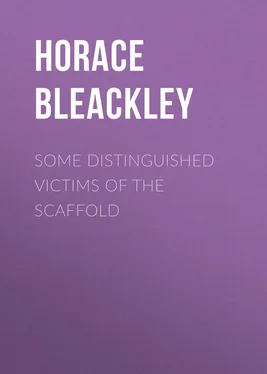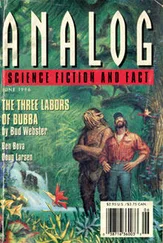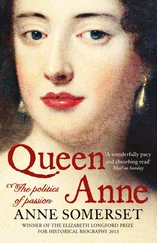Horace Bleackley - Some Distinguished Victims of the Scaffold
Здесь есть возможность читать онлайн «Horace Bleackley - Some Distinguished Victims of the Scaffold» — ознакомительный отрывок электронной книги совершенно бесплатно, а после прочтения отрывка купить полную версию. В некоторых случаях можно слушать аудио, скачать через торрент в формате fb2 и присутствует краткое содержание. Жанр: foreign_antique, foreign_prose, на английском языке. Описание произведения, (предисловие) а так же отзывы посетителей доступны на портале библиотеки ЛибКат.
- Название:Some Distinguished Victims of the Scaffold
- Автор:
- Жанр:
- Год:неизвестен
- ISBN:нет данных
- Рейтинг книги:5 / 5. Голосов: 1
-
Избранное:Добавить в избранное
- Отзывы:
-
Ваша оценка:
- 100
- 1
- 2
- 3
- 4
- 5
Some Distinguished Victims of the Scaffold: краткое содержание, описание и аннотация
Предлагаем к чтению аннотацию, описание, краткое содержание или предисловие (зависит от того, что написал сам автор книги «Some Distinguished Victims of the Scaffold»). Если вы не нашли необходимую информацию о книге — напишите в комментариях, мы постараемся отыскать её.
Some Distinguished Victims of the Scaffold — читать онлайн ознакомительный отрывок
Ниже представлен текст книги, разбитый по страницам. Система сохранения места последней прочитанной страницы, позволяет с удобством читать онлайн бесплатно книгу «Some Distinguished Victims of the Scaffold», без необходимости каждый раз заново искать на чём Вы остановились. Поставьте закладку, и сможете в любой момент перейти на страницу, на которой закончили чтение.
Интервал:
Закладка:
“It is impossible,” she replied.
On Sunday morning the doctor found the sick man a little better, but ordered him to keep his bed. Startling proofs of the accuracy of his diagnosis were forthcoming. One of the maids put into his hands the packet of arsenic found in the fire; while Norton the apothecary produced the powder from the pan of gruel. Addington at once took the guilty woman to task.
“If your father dies,” he told her sternly, “you will inevitably be ruined.”
Nevertheless she appears to have brazened the matter out, but desired the doctor to come again the next day. When she was alone, her first task was to scribble a note to Cranstoun, which she gave to her father’s clerk to “put into the post.” Having heard dark rumours whispered by the servants that Mr Blandy had been poisoned by his daughter, the man had no hesitation in opening the letter, which he handed over to the apothecary. It ran as follows: —
“Dear Willy, – My father is so bad that I have only time to tell you that if you do not hear from me soon again, don’t be frightened. I am better myself. Lest any accident should happen to your letters be careful what you write.
“My sincere compliments. – I am ever, yours.”
That evening Norton ordered Miss Blandy from her father’s room, telling Susan Gunnel to remain on the watch, and admit no one. At last the heartless daughter must have seen that some other defence was needed than blind denial. Still, the poor old sufferer persisted that Cranstoun was the sole author of the mischief. On Monday morning, although sick almost to death, he sent the maid with a message to his daughter.
“Tell her,” said he, “that I will forgive her if she will bring that villain to justice.”
In answer to his words, Miss Blandy came to her father’s bedroom in tears, and a suppliant. Susan Gunnel, who was present, thus reports the interview.
“Sir, how do you do?” said she.
“I am very ill,” he replied.
Falling upon her knees, she said to him:
“Banish me or send me to any remote part of the world. As to Mr Cranstoun, I will never see him, speak to him, as long as I live, so as you will forgive me.”
“I forgive thee, my dear,” he answered. “And I hope God will forgive thee, but thee should have considered better than to have attempted anything against thy father. Thee shouldst have considered I was thy own father.”
“Sir,” she protested, “as to your illness I am entirely innocent.”
“Madam,” interrupted old Susan Gunnel, “I believe you must not say you are entirely innocent, for the powder that was taken out of the water gruel, and the paper of powder that was taken out of the fire, are now in such hands that they must be publicly produced. I believe I had one dose prepared for my master in a dish of tea about six weeks ago.”
“I have put no powder into tea,” replied Miss Blandy. “I have put powder into water gruel, and if you are injured,” she assured her father, “I am entirely innocent, for it was given me with another intent.”
The dying man did not wait for further explanation, but, turning in his bed, he cried:
“Oh, such a villain! To come to my house, eat of the best, drink of the best that my house could afford – to take away my life, and ruin my daughter! Oh, my dear,” he continued, “thee must hate that man, thee must hate the ground he treads on. Thee canst not help it.”
“Oh, sir, your tenderness towards me is like a sword to my heart,” she answered. “Every word you say is like swords piercing my heart – much worse than if you were to be ever so angry. I must down on my knees and beg you will not curse me.”
“I curse thee, my dear!” he replied. “How couldst thou think I could curse thee? I bless thee, and hope that God will bless thee and amend thy life. Go, my dear, go out of my room… Say no more, lest thou shouldst say anything to thy own prejudice… Go to thy uncle Stevens; take him for thy friend. Poor man, – I am sorry for him.”
The memory of the old servant, who repeated the above conversation in her evidence at Miss Blandy’s trial, would seem remarkable did we not bear in mind that she went through various rehearsals before the coroner and magistrates, and possibly with the lawyers for the prosecution. Some embellishments also must be credited to the taste and fancy of Mr Rivington’s reporters. Still, the gist must be true, and certainly has much pathos. Yet the father’s forgiveness of his daughter, when he must have known that her conduct was wilful, although piteous and noble, may not have been the result of pure altruism. Naturally, the wish that Cranstoun alone was guilty was parent to the thought. Whether the approach of eternity brought a softening influence upon him, and he saw his follies and errors in the light of repentance, or whether the ruling passion strong in death made the vain old man struggle to avert the black disgrace that threatened his good name, and the keen legal intellect, which could counsel his daughter so well, foresaw the coming escheatment of his small estate to the lord of the manor, are problems for the student of psychology.
During the course of the day brother leech Lewis of Oxford – a master-builder of pharmacopœia – was summoned by the sturdy begetter of statesmen, and there was much bobbing of learned wigs and nice conduct of medical canes. Addington asked the dying man whom he suspected to be the giver of the poison.
“A poor love-sick girl,” murmured the old lawyer, smiling through his tears. “I forgive her – I always thought there was mischief in those cursed Scotch pebbles.”
In the evening a drastic step was taken. Acting on the principle of ‘thorough,’ which made his son’s occupancy of the Home Office so memorable at a later period, the stern doctor accused Miss Blandy of the crime, and secured her keys and papers. Conquered by fear, the stealthy woman for a while lost all self-possession. In an agony of shame and terror she sought to shield herself by the pretence of superstitious folly. Wringing her hands in a seeming agony of remorse, she declared that her lover had ruined her.
“I received the powder from Mr Cranstoun,” she cried, “with a present of Scotch pebbles. He had wrote on the paper that held it, ‘The powder to clean the pebbles with.’ He assured me that it was harmless, and that if I would give my father some of it now and then, a little and a little at a time, in any liquid, it would make him kind to him and to me.”
In a few scathing questions the worldly-wise Addington cast ridicule upon this weird story of a love philtre. Taking the law into his own resolute hands, with the consent of colleague Lewis he locked the wretched woman in her room and placed a guard over her. Little could be done to relieve the sufferings of poor ten-thousand-pound Blandy – who proved to be a mere four-thousand-pound attorney when it came to the test – and on Wednesday afternoon, the 14th of August, he closed his proud old eyes for ever. In her desperation the guilty daughter could think of naught but escape. On the evening of her fathers death, impelled by an irresistible frenzy to flee from the scene of her butchery, she begged the footman in vain to assist her to get away. During Thursday morning – for it was not possible to keep her in custody without legal warrant – a little group of children saw a dishevelled figure coming swiftly along the High Street towards the river. At once there arose the cry of ‘Murderess!’ and, surrounded by an angry mob, she was driven to take refuge in a neighbouring inn. It was vain to battle against fate. That same afternoon the coroner’s inquest was held, and the verdict pronounced her a parricide. On the following Saturday, in charge of two constables, she was driven in her father’s carriage to Oxford Castle. An enraged populace, thinking that she was trying again to escape, surrounded the vehicle, and sought to prevent her from leaving the town.
Читать дальшеИнтервал:
Закладка:
Похожие книги на «Some Distinguished Victims of the Scaffold»
Представляем Вашему вниманию похожие книги на «Some Distinguished Victims of the Scaffold» списком для выбора. Мы отобрали схожую по названию и смыслу литературу в надежде предоставить читателям больше вариантов отыскать новые, интересные, ещё непрочитанные произведения.
Обсуждение, отзывы о книге «Some Distinguished Victims of the Scaffold» и просто собственные мнения читателей. Оставьте ваши комментарии, напишите, что Вы думаете о произведении, его смысле или главных героях. Укажите что конкретно понравилось, а что нет, и почему Вы так считаете.












